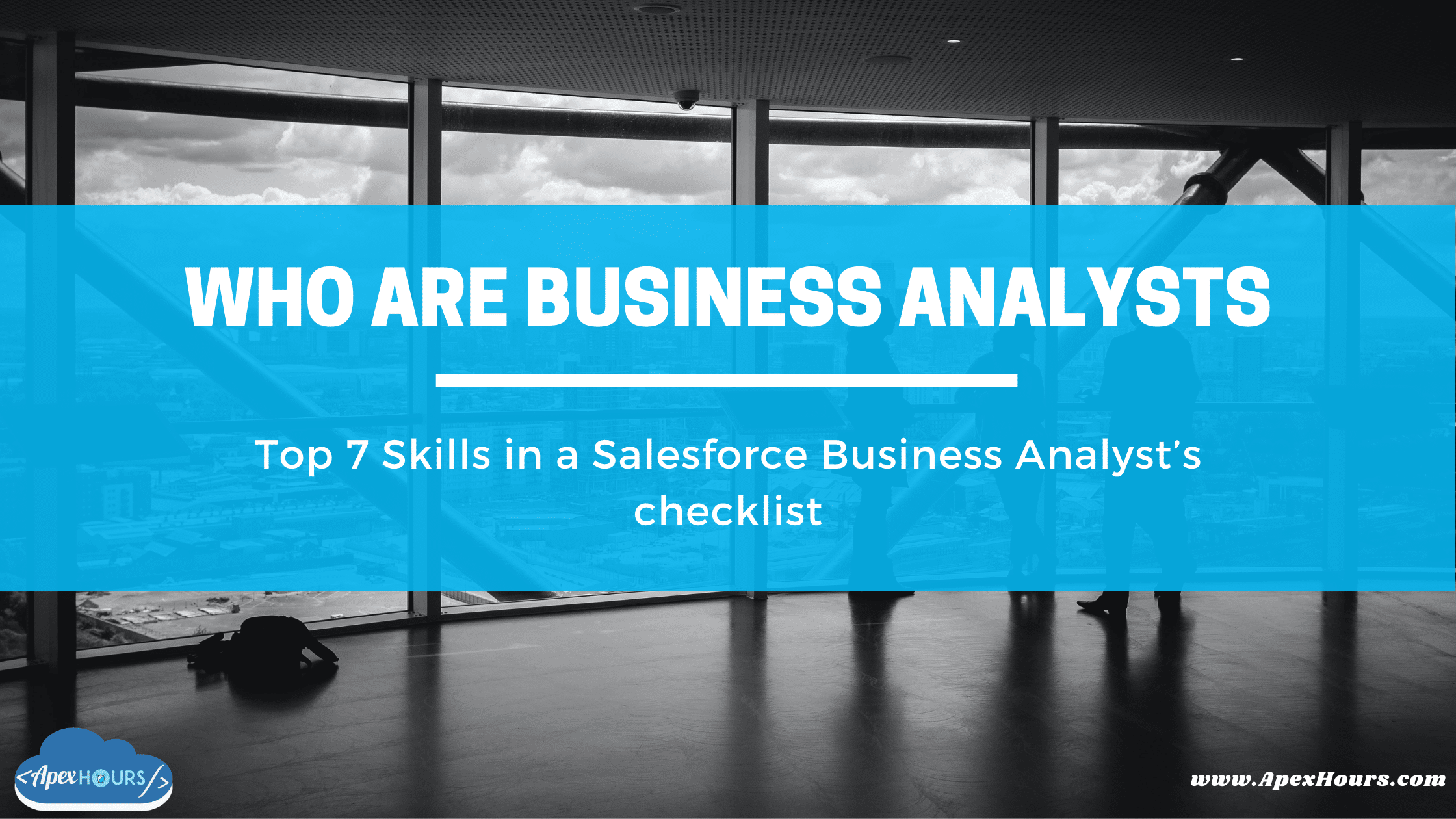“A role for everyone,” I answered when someone asked me the most unique thing about Salesforce. It’s true! When I tell people outside the industry that I work in IT, a ‘Developer’ or ‘Coder’ is the role that most of them assume I hold. However, Salesforce, as a technology, has broken stereotypes of the IT industry. The Salesforce industry offers diversified roles like Business Analysts, Architects, Consultants, Project Managers, Product Consultants, and many more, apart from Developers and QAs. And this is what I love about it. But when we dig deeper into unique Salesforce careers, a Business Analyst is one of the most desired roles. Join us to learn about Top 7 Skills in a Salesforce Business Analyst’s Checklist.
Who are Business Analysts?
Business Analysts (BAs) are the bridge between the customer and the implementation partner. BAs need to know the project inside out. They play an essential role at every stage of SDLC (Software Development Life Cycle) be it any methodology. During the Planning and analysis stage, BAs identify the requirements that define the project scope and identify the gaps. During the Design stage, BAs help solve the requirements with the Solution Architects and developers. During the Development stage, BAs regularly check if the Developers are on the right path and help them with requirement clarification if needed, and demo the product to the customer.
During the testing stage, BAs help QAs and customers test the system. During the Go-Live stage, BAs support the customer in training and post-implementation support. In some companies, BAs also demo the product during the presales stage. We can definitely say BAs wear multiple hats during the entire project life cycle.
Learn how to become a Salesforce Business Analyst.
Top 7 Skills in a Salesforce Business Analyst’s Checklist
When it comes to wearing multiple hats, you need multiple skills to ace it. If you are looking forward to building a career as a BA in the Salesforce industry or are already one but want to enhance your skills, ensure you develop or possess the below-mentioned skills.
1. Salesforce Product Expertise
You need to know the Salesforce Product since you are practically living and breathing Salesforce. It is essential to know the basics of all Salesforce products. Trailhead is the best way to get started to learn any Salesforce product. And if you want to connect to fellow Business Analysts, you must join the Salesforce Chatter Groups.
2. Documentation
Documentation takes up a major chunk of a BA’s time. Starting from the Requirement Gathering Notes, Schedule, Process Flows, User Stories, Architecture document, and UAT Strategy document – any and every customer-facing document needs to be written and/or approved by the BA of the project. If you are a BA, ensure your templates for all documents are handy. The kind of documents to provide customers will depend on your company. If they do not have any pre-defined templates, feel free to grab some from the internet and modify it as per your and your customer’s needs.
3. People Management
Managing people includes managing the customer and your internal team members. It also includes communication skills and email writing skills. Any form of communication done with the customer and team members has to be precisely done with recommended methods. You must ensure you have built trust with your customers and team and have transparent communication.
4. Project Management
Managing a project is tricky as you have to plan, execute, allocate, deliver, troubleshoot, and manage the changes the customer gives while being organized, detail-oriented, and people-friendly. All this while still maintaining a balance between your company and your customer! Enterprise companies have a separate Project Manager, however, for small and mid-sized companies, a BA and PM is usually the same role.
5. Understanding Business Processes
Being a BA, you will come across multiple projects, of various industries, each having a different business process. It is essential that you understand the process, pain points, and goals of the customers. Ensure you provide solutions that are happily accepted by the customer and are sustainable. You don’t want to be in a position where you have to change the process after a couple of months. The processes must be thought through considering each role involved in the organization and must make life easy for each persona involved.
6. Analysis
Analysis is the bread and butter for a Business Analyst (not just because it has Analysis in its name). You must be able to analyze the requirements, the gaps, the process, and then provide the solution to the customer. Analytical thinking and problem-solving are among the most important skills for a BA. Always have your thinking hat on about how you can innovate and make life better for your customers.
7. Data Management
The most important thing in the 21st century is knowing your data and when to use it correctly. Being a BA, you will deal with lots of data and you must know how to handle it. You must know how to analyze the data patterns, avoiding duplicates, and much more. Thankfully, we have dataloader.io by Salesforce to easily manage our data in Salesforce. And the game-changer, Einstein Analytics helps you play with your data the way you want it.
And, don’t forget to be more hands-on with your tools. The more tools you know, the more comfortable you will be. Customers prefer different tools, so you should be well-equipped with any tool. Skills that involve human touch will grow over the years with experience (for example, analysis), but there are certain skills that can be developed by reading or knowing the techniques (for example, documentation). Ensure you learn at least one new thing a day!
If you like this post then please leave one comment and share with others.





I’m learning Mulesoft currently. Very informative and inspiring article. Thank you.
Thank you for the article Mitul, I liked it a lot, very helpful to organize the skills for a BA